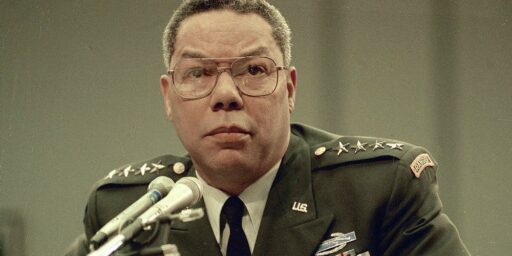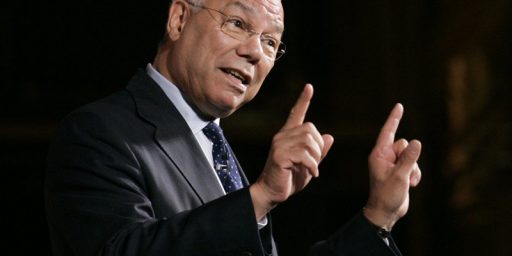Rodney King Dead At 47
The man whose name became a household word after a videographer caught the Los Angeles Police Department beating the crap out of him, and then again during the riots that resulted from the acquittal of those officers by an all-white jury, died today of an apparent drowning:
Rodney King, whose beating by Los Angeles police in 1991 was caught on camera and sparked riots after the acquittal of the four officers involved, was found dead in his swimming pool Sunday, authorities and his fiancee confirmed. He was 47.
Police in Rialto, California, received a 911 call from King’s fiancee, Cynthia Kelly, about 5:25 a.m., said Capt. Randy DeAnda. Responding officers found King at the bottom of the pool, removed him and attempted to revive him. He was pronounced dead at a local hospital, DeAnda said.
There were no preliminary signs of foul play, he said, and no obvious injuries on King’s body. Police are conducting a drowning investigation, DeAnda said, and King’s body would be autopsied.
“His fiancee heard him in the rear yard,” he said, and found King in the pool when she went outside.
King’s beating after a high-speed car chase and its aftermath forever changed Los Angeles, its police department and the dialogue on race in America.
King was 25 and on parole after a robbery conviction in April 1991. In an interview in 2011, he recalled he had been drinking and was headed home from a friend’s house when he saw a police car following him and panicked, thinking he would be sent back to prison. So he attempted to flee.
“I had a job to go to that Monday, and I knew I was on parole, and I knew I wasn’t supposed to be drinking, and I’m like ‘Oh, my God,'” he told CNN.
He realized he couldn’t outrun the police, but looked for a public place to stop. “I saw all those apartments over there, so I said, ‘I’m gonna stop right there,'” he said. “‘If it goes down, somebody will see it.'”
An amateur cameraman caught the scene as four white police officers struck King more than 50 times with their wooden batons and used a stun gun on him.
King said as the officers beat him, they yelled, “We are going to kill you, n***er,” although the officers denied using racial slurs.
The video shows King cowering on the ground and attempting to crawl away as he is surrounded by a crowd of police officers. Four of them used their nightsticks to strike him.
King was beaten nearly to death. Three surgeons operated on him for five hours.
The video of the beating appeared on national television two days later, focusing attention on the issue of racially-motivated police brutality.
“We finally caught the Loch Ness Monster with a camcorder,” King attorney Milton Grimes said.
Four LAPD officers — Theodore Briseno, Laurence Powell, Timothy Wind and Sgt. Stacey Koon — were indicted on charges of assault with a deadly weapon and excessive use of force by a police officer.
But following a three-month trial in the predominantly white Los Angeles suburb of Simi Valley, three of the officers were acquitted of all charges. The jury, which had no white members, deadlocked on one charge of excessive force against Powell, and a mistrial was declared on that charge.
Powell’s attorney, Michael Stone, said earlier this year the unedited video worked against King and helped prove the officers’ case.
“Most of the nation only saw a few snippets where it’s the most violent,” Stone said. “They didn’t see (King) get up and run at Powell.”
But African-Americans in Los Angeles exploded in outrage. Rioters ran through the streets — looting businesses, torching buildings and attacking those who were in the wrong place at the wrong time. The violence was responsible for more than 50 deaths and $1 billion in property damage.
On the third day of rioting, King emerged from seclusion to make a plea: “People, I just want to say, can we all get along? Can we get along?”
The violence ceased, but the debate did not.
The officers were ultimately convicted on Federal civil rights violations but King’s life took many twists and turns thanks to his ongoing drug and alcohol addiction problems. He had resurfaced a few times in recent years around the anniversary of the beating incident or the riots but had mostly disappeared from public view.





Given his lifestyle, I’m surprised he lived this long. Certainly, this isn’t the way I’d have expected him to go out. A really sad life with a sad end.
And I’d have guessed he was quite a bit older; he’s essentially my age.
I’m a member of a certain group that says “But for the grace of God, there go I.”
I was touched by the genuineness of his plea for us all to ‘get along’. Of all the mean spirited, blood thirsty acts I see in our current society, an authentic moment of decency and vulnerability stands out.
How one sees Rodney King almost certainly correlates to one’s position on the political spectrum (and no, Republicans aren’t racists, they’re just coincidentally concerned “about cutting taxes, and all these things you’re talking about are totally economic things and a byproduct of them is [that] blacks get hurt worse than whites.”—Steve Atwater, former RNC Chairman, presumably rotting in Hell.
Methinks someone needs to hire better editors.
@Nick: I think you mean Lee Atwater.
@ James
I am curious about your “lifestyle” comment. Clearly King had serious substance abuse problems, but he had a lot of company there. What was it about his lifestyle that made you think he would not see 50?
@anjin-san: Alcohol abuse and repeated drunken driving incidents, mostly, although he did get into a handful of violent altercations. It’s not a recipe for longevity.
I always thought that he was a nice guy who happened to be in the wrong place at the wrong time. It was a sad, disturbing thing to see parts of LA blown up, which of course was the work of outside agitators, not the residents who lived there and became victims of the senseless riots. I wonder what ever happened to the riot instigators? Probably back in Russia where they came from. Too bad they weren’t locked up ’til about 2050.